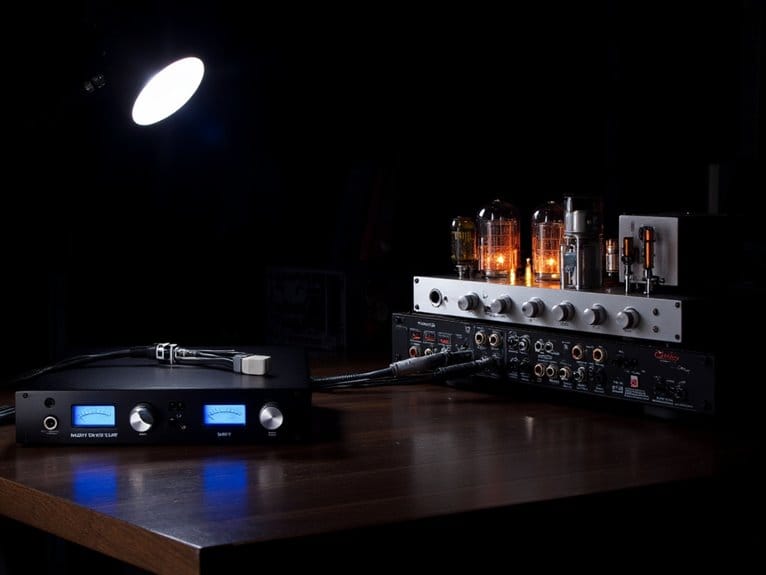Are All Fenders American Made?
Fender's American roots are well-established, but not all Fender guitars are made in the USA. While the company was founded in California in 1946, it has since expanded its manufacturing capabilities to include facilities in Mexico, Japan, and Indonesia. This strategic move allows Fender to cater to diverse player needs and offer a range of instruments at varying price points. However, the 'Made in USA' label still denotes a level of exceptional craftsmanship and prestige. To understand the nuances between Fender's American-made and international models, it's worth taking the plunge to explore the distinctions that set each apart.
We are supported by our audience. When you purchase through links on our site, we may earn an affiliate commission, at no extra cost for you. Learn more.
Fender's Early American Roots
Founded in 1946 by Clarence Leonidas Fender, Fender Electric Instrument Manufacturing Company, the pioneering guitar manufacturer, was born in Corona, California, USA, and its early years were deeply rooted in American innovation and entrepreneurship. This California origin story is a legacy to the region's rich history of innovation and creativity. The founding fathers, Clarence Fender and Leo Fender, were instrumental in shaping the company's vision and values. They embodied the American spirit of ingenuity and perseverance, driving Fender's early success. The company's humble beginnings in Corona laid the groundwork for its future growth and success, solidifying its position as a legendary guitar manufacturer. Fender's early American roots continue to influence the company's identity and reputation to this day, serving as a tribute.
Global Expansion and Outsourcing
As Fender's popularity and demand grew, the company began to look beyond its American borders, establishing manufacturing facilities and partnerships in Asia and Mexico to meet the needs of a global market. This strategic expansion allowed Fender to tap into new markets and customer bases, while also taking advantage of lower labor costs and more competitive pricing. By employing offshoring strategies, Fender was able to reduce production costs without compromising on quality, making its instruments more accessible to musicians worldwide. This move also enabled the company to allocate resources more efficiently, investing in research and development to drive innovation and stay ahead in the competitive music industry.
Made in Mexico Fenders
Fender's decision to establish a manufacturing facility in Mexico marked a significant milestone in the company's global expansion strategy, allowing it to further increase production capacity and offer a more affordable range of instruments without sacrificing quality. The Mexican facility benefits from the country's rich musical heritage and skilled workforce, showcasing exceptional Mexican craftsmanship. Import regulations and tariffs also played a role in Fender's decision, as manufacturing in Mexico enables the company to bypass certain restrictions and costs associated with importing instruments from other countries. As a result, Fender's "Made in Mexico" instruments have become increasingly popular, offering players a more affordable entry point into the Fender family without compromising on tone or quality.
Japanese and Indonesian Fenders
In response to growing demand for affordable, high-quality instruments in the Asian market, Fender established manufacturing facilities in Japan and Indonesia, leveraging the regions' skilled labor forces and favorable business environments to produce a range of models that cater to diverse player needs and delve into preferences. Japanese-made Fenders, often produced by Fujigen, boast exceptional quality and attention to detail, rivaling their American counterparts. In fact, some Japanese models, such as the Tokai copies, have gained a cult following among enthusiasts. Indonesian factories, on the other hand, focus on more affordable options, offering beginners and intermediate players a chance to own a Fender without breaking the bank. Despite differing price points, both Japanese and Indonesian Fenders adhere to Fender's stringent quality standards, ensuring players receive a reliable instrument that meets their expectations.
What "Made in USA" Means Today
Today, the 'Made in USA' label on a Fender instrument denotes a level of craftsmanship, tone, and prestige that is deeply rooted in the company's heritage and tradition of innovation. This label is not just a symbol of national pride, but a guarantee of exceptional quality and attention to detail. When you see 'Made in USA' on a Fender, you can imagine:
- Skilled craftsmen meticulously assembling each component
- Tone woods carefully selected for ideal resonance and sustain
- Electronic components precision-engineered for flawless performance
- Every instrument undergoing rigorous quality control before leaving the factory
In an era of global labels and varying certification standards, 'Made in USA' remains a badge of excellence, signifying a commitment to peak that has earned Fender its legendary status in the music world.


